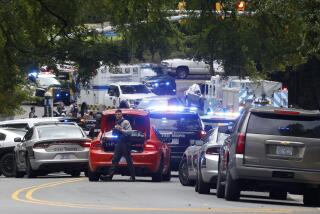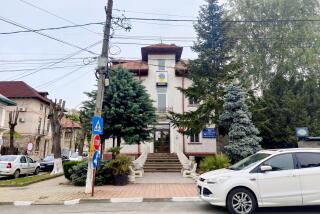Political Intrigue Is One Theory in Killing of Romanian-Born Professor : Murder: An outspoken doubter of his country’s revolution had received threats. Police say this was neither robbery nor a ‘hit.’
- Share via
CHICAGO — It is a whodunit rife with rumors of revenge, political plots and international intrigue. It all began with a single shot fired one late spring day on the University of Chicago campus.
The shot killed Ioan Culianu, a religion professor and prolific scholar who churned out scores of academic tomes on topics such as near-death experiences, altered states and the supernatural--and some biting attacks on the government of his native Romania.
Culianu was intrigued by mystery. In death, he has stirred up a mystery of his own:
Who would kill a courtly, popular, respected professor?
“We’re just flabbergasted at all the circumstances surrounding this,” said Detective Commander Fred Miller. “We are investigating as we normally do . . . but this is really one for the books.”
Friends and relatives suspect that Culianu may have been murdered to muzzle his harsh criticism of Romania. They said he had received threatening letters and had changed his office locks. Four days before his death, they said, he canceled a trip home this summer to see his mother because he feared for his safety.
“All I know was he was getting threats and his life was in danger,” said his sister, Therese Petrescu.
“He never said a name,” she said, “but it was clearly assumed” that the Romanian secret police were involved.
“I’m certain there is a connection, but I cannot accuse anyone directly,” Petrescu said. “We are convinced--all my friends and family--that it is a political crime.”
Police--who are being assisted by a Romanian-speaking FBI agent--would not comment on the political angle, though they dismissed early rumors of an occult connection. As the weeks pass, they continue to follow up on clues and tips.
“Hopefully, we’ll strike oil on one,” Miller said. “We don’t have the investigative leads we have in other cases.”
They have no witnesses, no weapon, no known motive.
Culianu, 41, was shot once in the back of the neck May 21 in a locked bathroom stall near his third-floor office in the Divinity School, probably by someone firing downward from the next stall.
Police ruled out robbery as a motive because his wallet and an expensive watch and ring weren’t taken. They also say it did not appear to be a professional job. “They will usually shoot more than once,” Miller said.
If Culianu was fearful, many people didn’t know. One colleague who saw him moments before he was shot said he eagerly talked of plans to visit his fiancee this summer and to work on a novel with her.
Ioan Culianu was a man “who had projects for 10 lives,” his sister said.
He spoke six languages and read a dozen more. He mastered Italian cooking. He wrote 18 books and more than 250 articles; and could expound on everything from Plutarch, the ancient Greek biographer, to Toontown, the chaotic cartoon world in the movie “Who Framed Roger Rabbit?”
He left Romania in his 20s, studied in Italy and France, earned three Ph.D.s and taught in the Netherlands, where he became a citizen. He also had strong feelings about his native country.
“My brother has always thought the only way for Romania to get out of its disastrous situation was to tell the truth, the naked truth. He was very cutting, almost cruel,” Petrescu said in French through an interpreter. “My brother wanted to do everything in his power and his ability to help his country.”
Fellow exiles suspect that his blunt talk about Romania, before and after the 1989 overthrow of Romanian dictator Nicolae Ceausescu, may have led to the killing.
“I tend to think there was a political connection,” said Andrei Codrescu, an author and radio commentator who knew Culianu. He noted that in a recent interview published in an opposition newspaper in Romania, the professor “expressed the opinion that the Romanian revolution was a coup d’etat started by the Securitate (secret police), with help from the KGB.”
That idea isn’t new, Codrescu said, but “there was something new in his tone. He was challenging the Securitate.”
Others in the Romanian community here now fear that they could be next.
“Many of us are afraid by this possibility of being killed. We are very critical, too,” said Liviu Cangeopol, a columnist for Lumea Libera, or Free World, a Romanian weekly in New York that ran about 30 Culianu articles.
Petrescu said her brother received threatening letters after his newspaper pieces came out. Though he was primarily a scholar, she said, “He always thought about his country and . . . you cannot think of Romania without being political.”
Dorin Tudoran, a Romanian magazine editor and friend in Washington, D.C, said Culianu at first did not take the threats seriously. Later, he became alarmed and “was really astonished about how dirty” they were.
It wasn’t the first time he sensed trouble. His sister said that his apartment was burglarized in 1989. Some computer disks were destroyed and others were missing.
Friends say it could have been a simple break-in. His neighbors had massive security and Culianu had just moved in and hadn’t yet installed extra locks. He quickly found another place to live.
About two years ago, Culianu also told Gregory Spinner, a graduate student and friend, that he feared that he would be detained if he returned to Romania.
Yet he continued to speak out. Graduate student Michael Allocca said Culianu circulated a petition before Ceausescu’s downfall on behalf of his brother-in-law, Dan Petrescu, who, according to his wife, was kept under house arrest. Petrescu and his wife, a dissenting writer, now live in France.
Culianu also gave a lecture last year about Romania and “stated without a shadow of doubt that it was not a grass-roots revolution,” Allocca said.
Still, he yearned to see his 83-year-old mother, a former professor, and “missed his country a great deal,” Petrescu said. “He agonized over the decision whether to go or not.”
His affection, though, was mixed with shame.
Spinner said he and a friend once gave Culianu a ‘Proud to be Romanian’ sticker. “He said, ‘Oh, I am not proud.’ He put it in his desk. It was obviously painful to him.”
A specialist in the history of religions, Culianu was to become an associate professor July 1. He recently had founded a journal “Incognita” and co-sponsored a conference on other realms. His latest book, published this month, examines everything from journeys to heaven and hell in ancient Sumeria to “soul-raising” in Singapore.
One professor recalled that Culianu sent her surreal postcards from his world travels and stayed up all night to help her translate a paper into French. Students remember him cooking up a mean dish of spaghetti carbonara and joining them on a “Ghostbusters II” outing. They also say when he had a new class, he stood at the door and shook hands with each student.
“He treated you like an equal,” Allocca said. “He never gave you the impression he didn’t have time with you, no matter how busy he was.”
At a memorial service, Divinity School professor Wendy Doniger recalled that if she asked Culianu about a topic, “he would not only tell me the best book about the subject, not only lend me or give me the book, but offer to introduce me to the author.”
More to Read
Sign up for Essential California
The most important California stories and recommendations in your inbox every morning.
You may occasionally receive promotional content from the Los Angeles Times.










